MercoPress. South Atlantic News Agency
Tag: British Antarctic Survey (BAS)
-
Wednesday, April 8th 2020 - 18:30 UTC
BAS ends Antarctic season and organizing the return: chartered ship will leave Falklands for UK 3 May
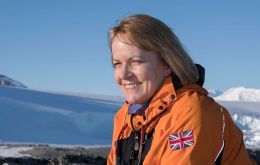
British Antarctic Survey (BAS) has announced exceptional plans to repatriate scientists, support teams and construction workers as they complete their Antarctic summer field season work.
-
Monday, August 19th 2019 - 09:53 UTC
Falkland Islander will be one of the captains of Australia's new state of the art icebreaker
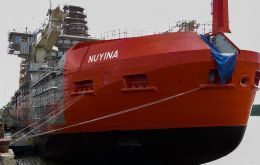
Australia’s new icebreaker, RSV Nuyina, is scheduled to make its maiden voyage to Antarctica in 2020-21. Two captains have already been named to lead the alternating crews operating the new vessel. They are Captain Scott Laughlin and Falkland Islander Captain Paul Clarke, both with experienced track records working in the Southern Ocean.
-
Wednesday, July 3rd 2019 - 18:51 UTC
South Sandwich Islands hold one of the world's enduring eight lava lake in a crater
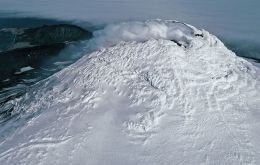
Satellite pictures confirm there is a persistent lava lake inside the crater of a remote British Overseas Territory (BOT) volcano. Few enduring lava lakes are known globally; the one at Mount Michael on Saunders Island in the South Atlantic may be only the eighth such example.
-
Friday, April 26th 2019 - 06:32 UTC
HMS Protector returns to Plymouth for first time in four years
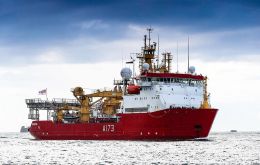
The ship has spent time in Antarctica supporting scientists and surveying the channels and waterways. HMS Protector has returned to Plymouth for the first time in four years. The ship spent a lot of her time in Antarctica supporting scientists and surveying the channels and waterways around the frozen continent.
-
Monday, March 11th 2019 - 18:30 UTC
Falklands: First surveys of the Burdwood Bank completed for Marine Managed Areas Project
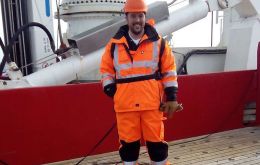
By Ander M. de Lecea - Research scientist Drs Ander de Lecea and Marina Costa of SAERI recently completed their first surveys of the Burdwood Bank, kicking off the “Fine Scaling of the Marine Management Areas of the Falkland Islands” (MMA) project.
-
Tuesday, January 22nd 2019 - 09:45 UTC
Albatrosses ‘Bird-borne’ radar project to enhance UK Overseas Territories environment
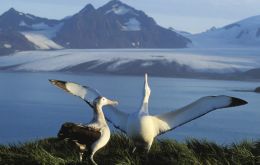
Seventeen innovative new projects will receive UK Government funding through the Darwin Plus initiative, to help protect and enhance the environment in the UK Overseas Territories. The seventh round of funding under the initiative, worth around £3.75m, will be shared amongst 17 projects around the globe. The funding will support international nature and help to achieve many of the commitments in the UK Government’s 25 Year Environment Plan.
-
Saturday, December 8th 2018 - 08:54 UTC
Whales watching and tracking with high resolution satellite imagery

Scientists have used detailed high-resolution satellite images provided by Maxar Technologies’ DigitalGlobe, to detect, count and describe four different species of whales. Reported this week in the journal Marine Mammal Science, this study is a big step towards developing a cost-effective method to study whales in remote and inaccessible places, that will help scientists to monitor population changes and understand their behavior.
-
Wednesday, July 11th 2018 - 06:55 UTC
Britain's new polar research ship scheduled to hit the water next Saturday
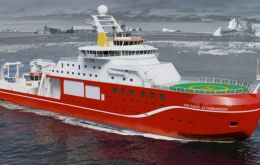
The assembled hull of Britain's new polar research vessel, RRS Sir David Attenborough is now standing on the slipway of the Cammell Laird yard in Birkenhead, awaiting launch day. Weather and tide permitting, she should slide into the River Mersey on Saturday, July 14th.
-
Monday, May 14th 2018 - 20:04 UTC
Argentina/UK: Agreement to enhance Antarctic scientific co-operation
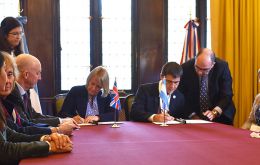
The British Antarctic Survey (BAS) and the Instituto Antártico Argentino (IAA) today signed a memorandum of understanding.The agreement will enable the implementation of joint science and technology research projects as well as enhanced training and exchange of personnel. .
-
Friday, March 9th 2018 - 04:38 UTC
Plan B for RRS James Clark Ross mission to Antarctica Larsen C Ice Shelf
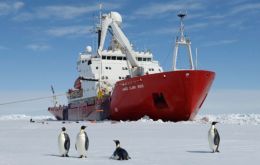
Heavy sea ice conditions have thwarted a science mission from reaching the Larsen C Ice Shelf in Antarctica from which a large iceberg broke off in July 2017. A team of scientists, led by British Antarctic Survey (BAS), are travelling on board the RRS James Clark Ross. Sea ice, up to 4-5 meters thick, has made progress for the ship very slow and on 28 February) the ship’s captain made the difficult decision not to continue.
